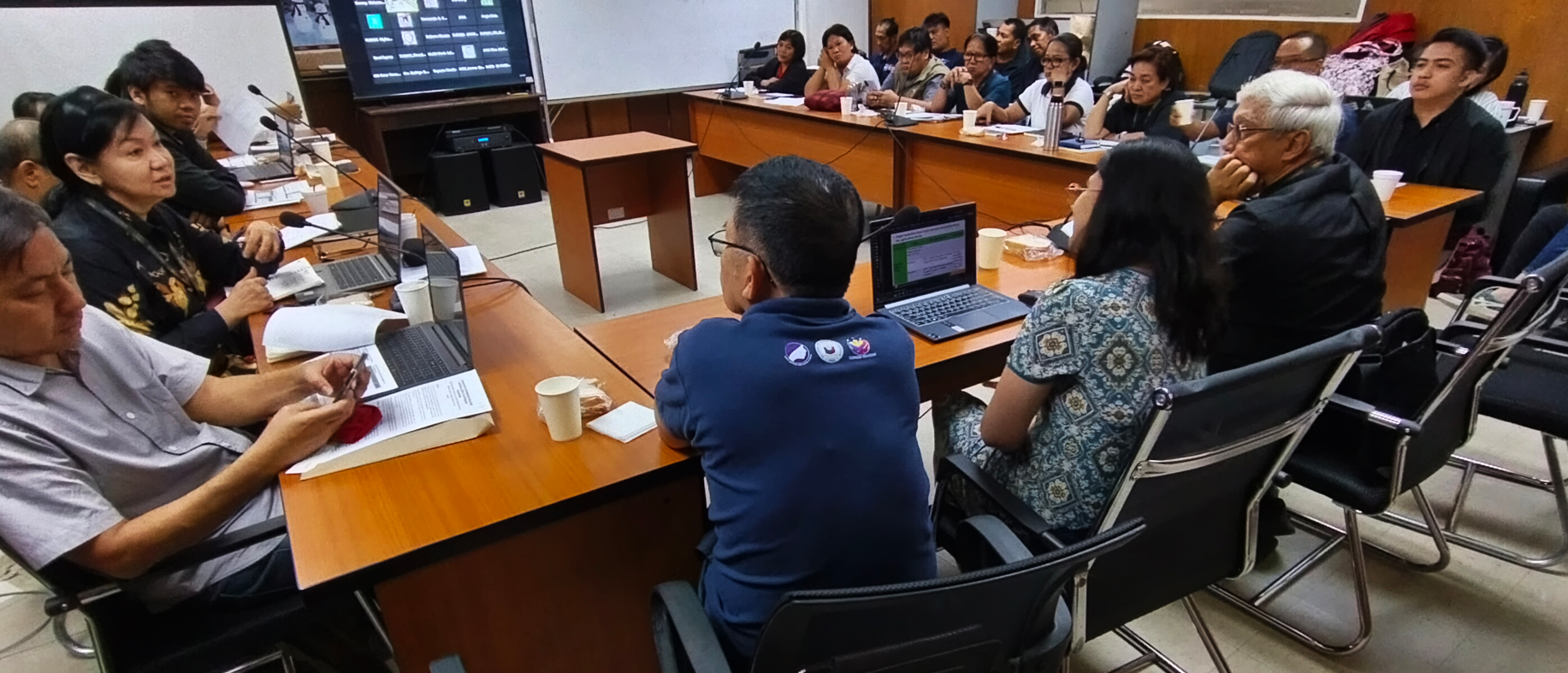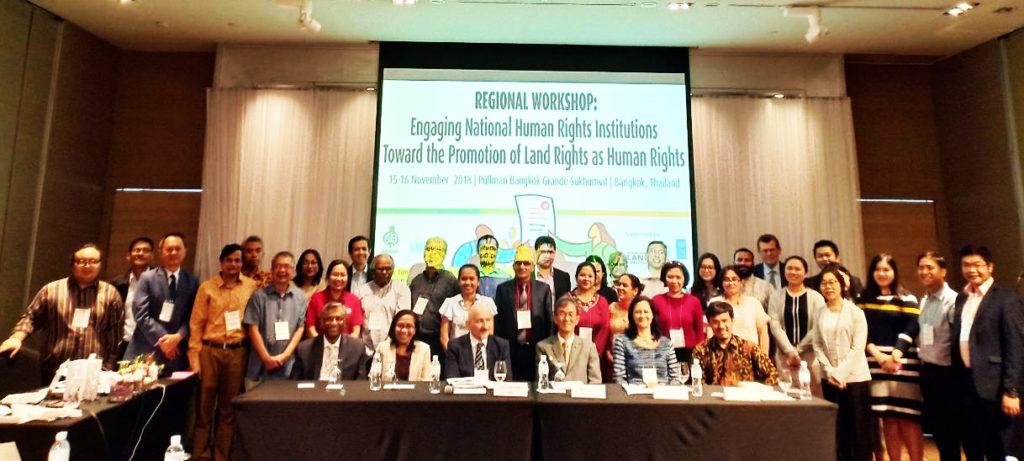


BANGKOK, Thailand – In light of increasing land investments in Asia and intensifying conflicts over scarce resources, civil society organizations (CSOs) working with rural communities, national human rights institutions and intergovernmental organizations, came together to assert that land rights are human rights.
CSOs and NationalHuman Rights Institutions (NHRIs) from eight Asian countries met in Bangkok on15 and 16 November 2018 for a conference on Engaging National Human Rights Institutions Toward the Recognition of Land Rights as Human Rights. The conference was co-organized by the Asian NGO Coalitionfor Agrarian Reform and Rural Development (ANGOC), Land Watch Asia (LWA)Campaign, International Land Coalition, United Nations Development Program(UNDP), and UN Office of the High Commissioner on Human Rights (OHCHR).
The two-day event is part of an ongoing initiative by the Land Watch Asia Working Group on Land Rights as Human Rights, convened by ANGOC, and supported by the International Land Coalition (ILC). Working in Bangladesh, Cambodia, India, Indonesia, Nepal, and the Philippines, the initiative aims to: (a) contribute to the reduction of land rights violations, and (b)mainstream the recognition of land rights as human rights. As an initial step,the Working Group sought to engage NHRIs and regional human rights organizations towards joint actions to monitor and address land conflicts.
In attendance were CSOs closely working with rural communities as well as officials of the National Human Rights Commissions of Bangladesh, Nepal, Timor Leste, and the Philippines.
Officers from the National Human Rights Commission of Thailand (NHRCT), headed by Chairperson What Tingsamitr graced the occasion as well. The Chairperson welcomed the body with a message that highlighted the correlation of secure rights to land with the protection of inalienable human rights. He likewise shared NHRCT’s recommendations to the government of Thailand to concretely address the country’s own land rights concerns.
Through the initiatives of the NHRCT, the Thai government is also nearing the completion of their National Action Plan (NAP) on Business and Human Rights, with a chapter dedicated to land rights.
The Conference discussed the United Nations Guiding Principles on Business and Human Rights (UNGP BHR) with an overview of the Guiding Principles’ Protect, Respect, and Remedy pillars provided by Livio Sarandea of the UN Development Programme.
Given thecontinued surge of land investments in Asia, governments should apply theprinciples of business and human rights to safeguardthe land rights of poor and marginalized sectors in the quest foreconomic development. As part of the regional initiative of the LWA WorkingGroup, Joel Pagsanghan of ANGOC presented the status of adoption andimplementation of the UNGP BHR in six countries in Asia.

While governments of the six countries have yet to formulate NAPs to operationalize the BHR, NHRIs of the states have been working closely with CSOs on activities to facilitate the creation of a NAP. Sarandea underscored that CSOs and NHRIs may utilize the Universal Periodic Review process of UN member-states in advocating for land rights protection in business ventures.
Although severalland conflicts have been attributed to the entry of investors and the drive forindustrialization, a closer look into Asian experiences reveal that land conflictsare brought out by a number of other interlinked factors as well. In a two-partsession, representatives from South and Southeast Asia each shared findings ofresearch on recent prevalence and causes of land conflicts in their respectivecountries.

State land acquisitions, large-scale plantations and extractive industries, unfair business contracts, and overlapping land policies emerged as common drivers of land conflicts in Asia. These conflicts have displaced thousands of families from their homes, caused food insecurity, damage to the environment, and have led to the death of hundreds of rights defenders.
Tying the narratives together, former ANGOC Chairperson Antonio Quizon reflected that land conflicts are oft caused by enduring historical injustices, inequitable access to vital resources, faulty implementation of asset reform laws, clashes between tenure systems, lack of regard for rights of vulnerable sectors, and misappropriation of state domains.
Because secure land rights are essential to the full enjoyment of other rights, land conflicts have dramatically crippled the bundle of human rights exercised and enjoyed by the rural poor. As Quizon puts it, “the right to land and security of tenure are human rights, regardless of how laws see them.”

The Working Group also set forth to initialize the creation of a tool to monitor land rights and human rights in business ventures. In behalf of the CSOs involved inits formulation, Roel Ravanera of the Xavier Science Foundation in the Philippines presented the set of indicators and corresponding points identifiedfor the Scorecard for Private Investors in Land and Agriculture in Asia.

Using the principles of the UNGP BHR and the Principles on Responsible Agricultural Investments (rai), the LWA Working Group developed a scorecard tool for local communities to assess and monitor investors’ respect for land and human rights of communities affected by their operations. At present, the scorecard is still a work-in-progress, and is only applicable to private rural investments at the initial stages of their operations. Nevertheless, conference participants welcomed the scorecard tool as a promising development that allows for an alternative,community-based, rights monitoring mechanism.
Dr. SereeNonthasoot, Thailand’s representative to the ASEAN Intergovernmental Committeeon Human Rights (AICHR), provided the body with several ideas on moving the discoursesforward. He affirmed the integral role that NHRIs play in protecting humanrights, and encouraged attendees to monitor their governments’ compliance tointernational declarations and the common targets of the SustainableDevelopment Goals (SDGs).

Recognizing the international dimensions of land rights issues, Dr. Nonthasoot urged those in attendance to further engage with other countries, regional bodies, and the international community in their monitoring.
The conferenceended with the body’s adoption of the Bangkok Declaration on Land as Human Rights, in which CSOs and NHRIs expressed their commitment to join efforts towards the full realization of land rights and human rights.

The Declaration read, “Together with other land/human rights defenders and organizations, we commit ourselves to continuously monitor and document human rights violations and abuses arising out of land conflicts,bringing these violations and abuses to the attention of international bodies,such as the United Nations through the Universal Periodic Review (UPR) Process,and to vigorously engage governments and businesses on these issues through vigilant and non-violent means.” (Read the full Declaration here)
ANGOC Vice Chairperson Chet Charya from Cambodia provided the closing remarks for the conference. As one body, the attendees also supported the call for the establishment of an independent NHRI in Cambodia.
